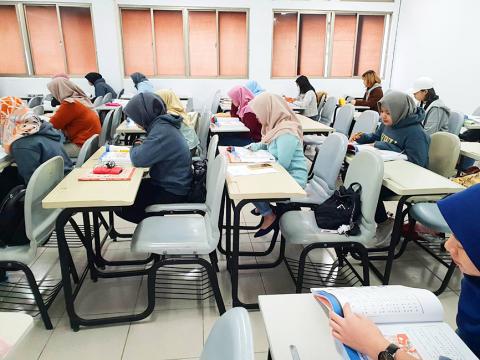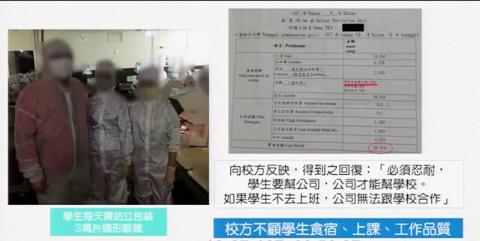Hundreds of Southeast Asian students recruited to Taiwanese universities under the government’s New Southbound Policy have allegedly been tricked into doing illegal work at factories, with some working 10 hours per day, Chinese Nationalist Party (KMT) Legislator Ko Chih-en (柯志恩) said yesterday.
At least six schools have allegedly collaborated with employment agencies and companies to make their students provide cheap labor, Ko told a meeting of the Legislative Yuan’s Education and Culture Committee.
One school, which she later identified as Hsing Wu University in New Taipei City’s Linkou District (林口), arranged for its students to work 10 hours per day, four days per week at an optics manufacturer, she said.

Photo courtesy of Hsing Wu University
“They had to stand for 10 hours and package 30,000 contact lenses every day” and were banned from taking any leave, she said.
When students told the school about their work, it replied that they “must help the company so that the company can help the school,” she said.
The students were assigned to shabby dormitories in Hsinchu to be near their work, she said, adding that the rooms did not have desks.

Photo: Lin Hsiao-yun, Taipei Times
“Two days a week, they would have to wake up at 5am and be driven to Linkou for classes on a bus [arranged by the school] that departs at 6am,” she said.
Employment agencies tricked many of the approximately 200 students into applying for the program through advertisements claiming that they would be offered free accommodation and meals, as well as a monthly salary of about NT$20,000 for “internship” work, Ko said.
However, after arriving, the students realized that starting from their sophomore year, they would need to pay more than NT$40,000 every semester for tuition, accommodation and other expenses, which placed them under great financial pressure, she said.
“This is not an isolated case, but a reoccurring pattern” that shows how schools, employment agencies and companies are taking advantage of the New Southbound Policy internship program designed to encourage students from Southeast Asia to take classes and complete internships, she said.
“Schools offer internship programs and receive subsidies from the Ministry of Education, and employment agencies trick students into joining the programs,” Ko said. “Schools then arrange for internships at companies, which pay employment agencies for introducing the workers.”
Many agencies have boasted about how students recruited under the program are more “useful” than migrant workers, as they are not subject to labor law restrictions, she said.
The ministry has been aware of the problem since last year and has warned schools against recruiting students through employment agencies, Acting Minister of Education Yao Leeh-ter (姚立德) said.
“Those found to have done so would lose subsidies and be banned from offering international internship programs and, in more serious cases, required to receive special consultation,” he said.
The ministry’s international internship program requires review, he added, promising to launch investigations into all schools involved.
Students can perform part-time work that is unrelated to their school work as long as it does not exceed 20 hours per week, he said.
“If students are exploited, we would definitely intervene,” he added.
Hsing Wu University did not recruit students through employment agencies and only helped arrange legal part-time work for students who needed income to cover their living expenses, university vice president Chen Yi-wen (陳義文) told reporters at a news conference after the meeting.
Companies have provided free accommodation to 25 students and compromised by exempting Indonesian students from night shifts for their prayers, university international section head Kuo An-min (國安民) said, adding that the students’ lives have turned “from black and white to full color” because of the program.
Additional reporting by Rachel Lin

SECURITY: As China is ‘reshaping’ Hong Kong’s population, Taiwan must raise the eligibility threshold for applications from Hong Kongers, Chiu Chui-cheng said When Hong Kong and Macau citizens apply for residency in Taiwan, it would be under a new category that includes a “national security observation period,” Mainland Affairs Council (MAC) Minister Chiu Chui-cheng (邱垂正) said yesterday. President William Lai (賴清德) on March 13 announced 17 strategies to counter China’s aggression toward Taiwan, including incorporating national security considerations into the review process for residency applications from Hong Kong and Macau citizens. The situation in Hong Kong is constantly changing, Chiu said to media yesterday on the sidelines of the Taipei Technology Run hosted by the Taipei Neihu Technology Park Development Association. With

CARROT AND STICK: While unrelenting in its military threats, China attracted nearly 40,000 Taiwanese to over 400 business events last year Nearly 40,000 Taiwanese last year joined industry events in China, such as conferences and trade fairs, supported by the Chinese government, a study showed yesterday, as Beijing ramps up a charm offensive toward Taipei alongside military pressure. China has long taken a carrot-and-stick approach to Taiwan, threatening it with the prospect of military action while reaching out to those it believes are amenable to Beijing’s point of view. Taiwanese security officials are wary of what they see as Beijing’s influence campaigns to sway public opinion after Taipei and Beijing gradually resumed travel links halted by the COVID-19 pandemic, but the scale of

A US Marine Corps regiment equipped with Naval Strike Missiles (NSM) is set to participate in the upcoming Balikatan 25 exercise in the Luzon Strait, marking the system’s first-ever deployment in the Philippines. US and Philippine officials have separately confirmed that the Navy Marine Expeditionary Ship Interdiction System (NMESIS) — the mobile launch platform for the Naval Strike Missile — would take part in the joint exercise. The missiles are being deployed to “a strategic first island chain chokepoint” in the waters between Taiwan proper and the Philippines, US-based Naval News reported. “The Luzon Strait and Bashi Channel represent a critical access

Pope Francis is be laid to rest on Saturday after lying in state for three days in St Peter’s Basilica, where the faithful are expected to flock to pay their respects to history’s first Latin American pontiff. The cardinals met yesterday in the Vatican’s synod hall to chart the next steps before a conclave begins to choose Francis’ successor, as condolences poured in from around the world. According to current norms, the conclave must begin between May 5 and 10. The cardinals set the funeral for Saturday at 10am in St Peter’s Square, to be celebrated by the dean of the College